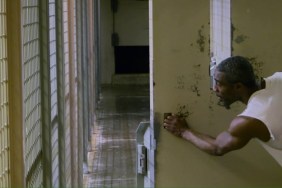
The Stanford Prison Experiment, a tough, unnerving watch based on a real-life research experiment held in the early ’70s at Stanford University, says as much about human nature and the effect of power over both the powerful and the powerless as it does about modern society’s penchant for reality television and the constant desire to not only witness, but revel in the downfall of others. Are you a good person? You’d probably say “yes”, but how closely are any of us looking when asked the question?
The titular experiment was started by Dr. Philip Zimbardo (played by Billy Crudup), a Stanford professor who took 24 college kids over the summer of 1971 and, with the flip of a coin, assigned twelve to be guards and twelve to be prisoners in a simulated prison on the Stanford campus over the course of two weeks. An ensemble led by the likes of Ezra Miller (We Need to Talk about Kevin), Tye Sheridan (Mud), Johnny Simmons, Thomas Mann and Chris Sheffield make up the prisoners while Michael Angarano takes the lead as the “John Wayne” of the guards.
To call it an experiment is even something the film begins to question midway through as the group, almost immediately, falls in line with regard to their respective roles to the point this becomes less an experiment and more an actual reality. Once the guards break the rule stating they are not to physically attack the prisoners you’d think the experiment would come to an end, or at least paused for a moment, but Zimbardo and his team, which includes Nelsan Ellis, James Wolk and Matt Bennett, only sit back and watch as things begin to unfold, unwittingly playing a role in the experiment in which they thought they were only observing.
The psychology playing out on screen is fascinating and unsettling, but even we as the audience could begin to ask ourselves why we’re watching. The obvious answer is to say because we know it’s going to an end, but that doesn’t make moments in this film any less abhorrent. The final 15 minutes specifically are very hard to watch, primarily because the “experiment” has already gone beyond “too far”. How much more of it could I have watched and what was the ultimate takeaway?
The performances from top to bottom are wonderful, though most of the praise belongs to the group playing the prisoners. Michael Angarano is truly a menace as Christopher Archer, taking his role as prison guard to the extreme and immediately embracing the power he is about to have over his 12 role-playing prisoners. Angarano, however, has one of the easier roles as he’s playing a character that’s playing a role. It’s performances from the likes of Ezra Miller as Prisoner 8612 that really take things to another level.
The prisoners are also playing a role at first, just a bunch of college kids earning $15 a day to take part in an experiment, but not a minute into the scenario are they asked to strip naked, deloused and given a sack-like dress with their corresponding prisoner number sewn into the chest. They are humiliated instantly and this humiliation and degradation, which is not only approved, but scripted, by Zimbardo and his team, turns this into more a real life scenario than any kind of experiment asking the actors playing the prisoners to deliver the true reality of the situation.
Are we all good people? Can you say you wouldn’t humiliate a stranger if put in a situation where it was not only considered a “part of the job”, but actually encouraged? The “good” in us tells us we wouldn’t, we’d be right and fair, and we hold on to that, but history tells us that’s just not true.
The Stanford Prison Experiment effectively questions this goodness in humanity and does so with powerful filmmaking from director Kyle Patrick Alvarez, working from a script by Tim Talbott who’s written for everything from “South Park” to “Chicago Fire“. Commanding a strong cast, Alvarez has made a film akin to the likes of 2012’s Compliance where-in the audience will begin asking questions just as Zimbardo’s girlfriend, Christina (Olivia Thirlby), asks at one point. “Why don’t they just quit?” Perhaps it’s the most striking question in the entire film and I’m not sure there is any possible answer other than fear, but even then, what are they afraid of? It’s an experiment right? It’s not real? Or is it?
This movie eats away at the core of human decency and it feels somewhat indecent to even watch it and yet, situations where people do the worst to other humans are seen on TV every single day, disguised as stories of New York housewives and their trials and tribulations with their so-called friends. The Bravo network has been running Stanford Prison Experiments in households across the country for several years now and we as a society are the monitors while Bravo execs are the guards lording over these unsuspecting prisoners, editing their lives into a salacious narrative for monetary gain. Websites like TMZ can turn the story of a music mogul running over the head of another man into “must watch Internet TV” and millions watch and think nothing of their own responsibility in the steady, cultural decline of our society.
By the end of the film we learn Zimbardo was a technical advisor and has shifted his lectures to discuss human nature in terms of the psychology of authority and abuse of power. Thing is, what good is it? If even the best of us can turn abusive with only a change of clothes, a pair of sunglasses and a night stick is there any measure of psychology that is going to change that primal instinct? In the end, The Stanford Prison Experiment is not only excellent for its filmmaking and performances, but in the way it raises these kinds of questions, as well as exemplifies the fact that something as trivial as a coin flip can decide your future.









